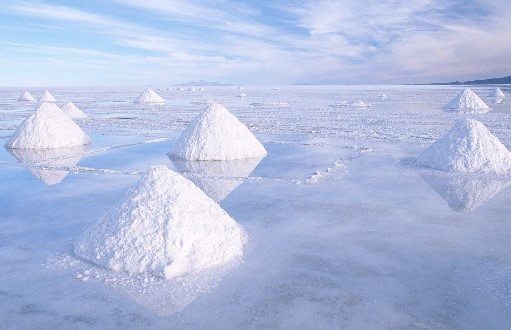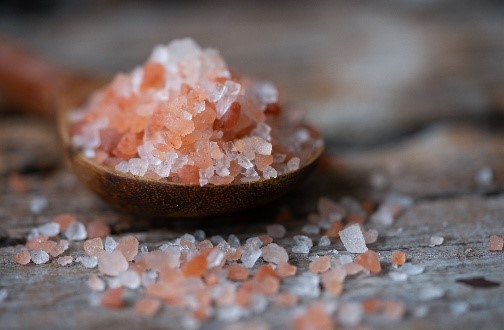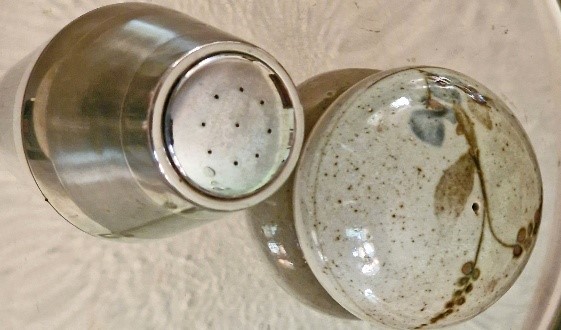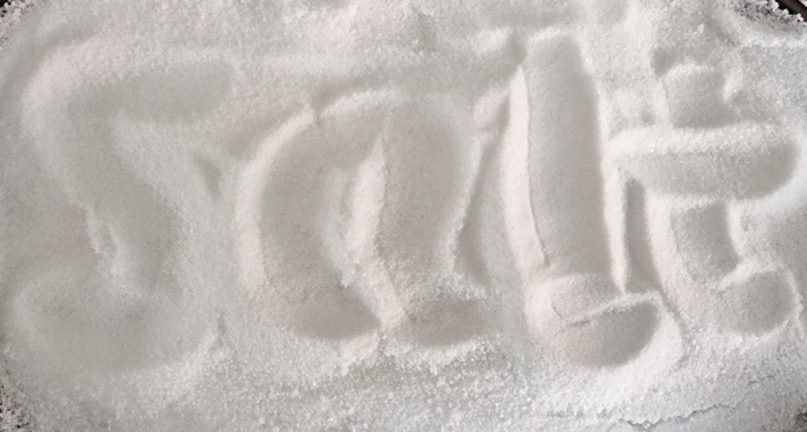As I set out to muse over salt, which I have taken for granted all my life, I was thinking about the common use of the word, for example: pass the salt, take it with a pinch of salt, salt mine, salt licks, salty demeanour etc. As I read about it, I was surprised by the new information I found about its composition and use. I was taken back to my school chemistry days, which I hated because of the smell of the chemicals. I ended up dropping chemistry as a subject at O-levels which was a fork in the road of my career prospects.
The word salt has both a chemical meaning and a rich linguistic history, tying into various fields of science, language, culture, and even humour. Chemically, salt is a compound that results from the reaction of an acid and a base. (A basic definition of a base is a substance that reacts with acids to form a salt.) This process is called neutralization, where the acid and base combine to produce water and a salt.
The most common example of salt as a chemical is “sodium chloride” (NaCl), the substance we commonly refer to as table or common salt. Chemically, salts are essential for numerous bodily biological processes, such as nerve transmission, body fluid balance, and muscle function. Salts, like potassium chloride or magnesium sulphate, are vital for health and industrial applications.
Salt, as a word, has permeated the English language in phrases like “worth one’s salt” (implying value), “take it with a pinch of salt” (suggesting scepticism), and “salt of the earth” (indicating goodness or humility). “Salt” can have figurative meanings as well. Someone described as “salty” is perceived as slightly bitter or grumpy.

Salt has historically been a valuable commodity. In ancient times, it was sometimes used as currency in many parts of the world, hence the word “salary” in English, which comes from the Latin “salarium”, money paid to soldiers for salt.
Salt has been a symbol of purity and preservation, as it prevents decomposition, and has significant roles in various religious rituals and culinary traditions worldwide. Salt has been used in medicine for thousands of years. Salt tablets may help replace low levels of sodium in the body. Saline, a mixture of common salt and water, has several uses in medicine including cleaning wounds, and help with dry eyes. As I read about salt, I learnt that medicinal salts contain essential minerals such as magnesium, zinc, sulphate, potassium, and others, which give them their healing properties. We are told that over 50% of all drug molecules used in medicine exist as salts.
As a healing substance, salt is used widely in remedies for ailments, reflecting its value in traditional medicine. One of the most successful interventions against diarrheal diseases is oral rehydration therapy (ORT): a simple, cheap salt, water and sugar solution developed in Dacca, in today’s Bangladesh, in the 1960s.
I have never been in contact with smelling salts (ammonium carbonate) although I knew that they are used to help revive someone who has fainted. I have learnt that when smelling salts are exposed to air, they release ammonia gas (NH₃), which has a strong, sharp odour. The ammonia irritates the mucous membranes in the nose and lungs, stimulating the respiratory system. This causes the person to breathe more deeply and become more alert, helping to revive them.

As a first aid, salt is my first point of call when I have a sore throat or gum discomfort. I gurgle with warm salty water when I feel signs of a developing sore throat and brush with salt for gum discomfort. I wash any injury breaking my skin with salt, as first aid. Most times it is the only treatment needed to heal the wound.
Salt holds deep symbolic meaning across many world religions and spiritual traditions. It is often associated with purity, preservation, wisdom, grace and covenant (as a bond). In many African spiritual practices, salt is used for healing, spiritual protection, and cleansing.
In Christianity, we read in the New Testament (Matthew 5:13) of Jesus referring to His followers as “the salt of the earth”, symbolizing their role in preserving goodness and spreading wisdom. He says: “You are the salt of the earth, but if the salt has lost its taste, how shall its saltiness be restored? It is no longer good for anything except to be thrown out and trampled under people’s feet.” And in Mark 9 :50 He says: “Salt is good (for life), but if it loses its saltiness, how can you make it salty again? Have salt among yourselves and be at peace with each other.” Paul in a very subtle way infers salt into food with proper communication. In Colossians 4:6, he wrote that our speech should always be gracious, seasoned with salt, so that we may know how we ought to answer everyone.
In Judaism, salt is used in rituals, symbolizing the eternal nature of God’s bond with Israel. Salt is sprinkled on bread during the Shabbat meal to commemorate ancient sacrifices and as a symbol of preservation and flavor in life. We read in the Old Testament offerings being seasoned with salt as a sign of God’s enduring promises (Leviticus 2:13).
In Islam, while salt is not explicitly mentioned in the Quran with a spiritual meaning, it is stated twice with reference to the power of Allah who released two seas, one fresh and sweet and one salty and bitter, and He placed between them a barrier and prohibiting partition.
Salt is used in Hindu, Buddhist, and Japanese Shinto traditional rituals for purification and cleansing spaces and individuals of negative energies and attract positive energy.
A personal involvement in ritualistic use of salt was way back in mid-60s while studying in Scotland and visiting a friend in a little village at the England/Scotland border during Hogmanay (New Year’s Eve). I found myself involved in mumbo jumbo of natives of Northern England. In both England and Scotland, salt was (or may be is) believed to break or undo curses. A ring of salt is believed to protect individuals from supernatural harm. As the darkest skinned person in my friend’s home I was visiting, I was tasked with the responsibility of keeping away bad luck from the family in the incoming year by, among the rituals I performed, throwing salt over my left shoulder to blind the devil lurking behind.

Salt’s role in East African cultures is multifaceted, reflecting its critical importance not only as a necessity but also as a resource deeply embedded in traditions, spirituality, and social practices. The Baganda (of Uganda), use salt in rituals connected to ancestors and spirits during libations or spiritual ceremonies. Similar uses of salt are found in many other African cultures spanning spiritual, ceremonial, and practical purposes, varying across cultures traditions and regions. It is often regarded as a symbol of life preservation, used for healing, and social bonding. It is also
part of offerings to certain deities to symbolize purity and preservation of ancestral blessings and continuity in life.
Salt’s universal presence and profound symbolic meanings in religious and spiritual practices highlight its significance as a natural element closely tied to human life and spirituality. In short, salt has a broad scientific and cultural footprint, making it a fascinating example of how a single word can carry such a rich variety of meanings across disciplines and traditions. I like the concept of being “salt of the earth” not salt “in” the earth, which is destructive, but salt “of” the earth symbolizing preserving goodness and spreading wisdom. What are you? Are you the salt in the family or community causing chaos or the salt of the family or community preserving goodness and spreading wisdom?
Thank you for being part of the Fork in the Road Blogs: Reflections on Life. Be sure to look out for the next episode when I will be writing about Living with visual challenges. If you gathered something useful, please feel free to share the blog. My books, Fork in the Road: Creating a future of value starting from where you are and A view round the bend. Setting goals for your life’s journey are available for purchase at Aristoc bookshops in Kampala, Uganda and online at Amazon.
Your comments on my musings are most welcome and let me know whether there is a topic you would like me to muse over.


1 Comment
Robert Yiga
Salarium for me